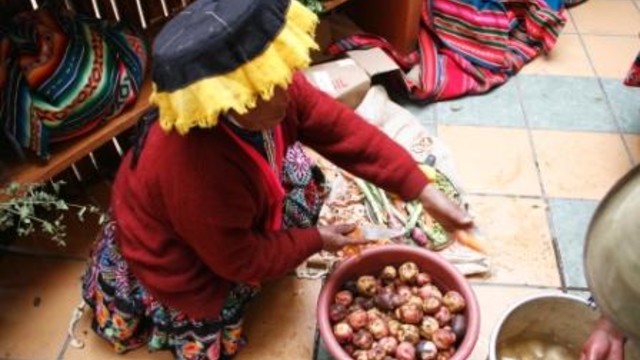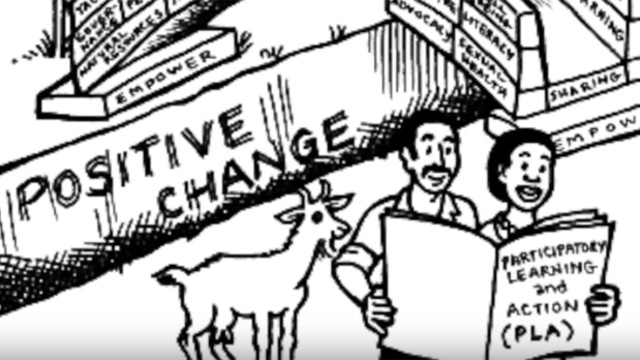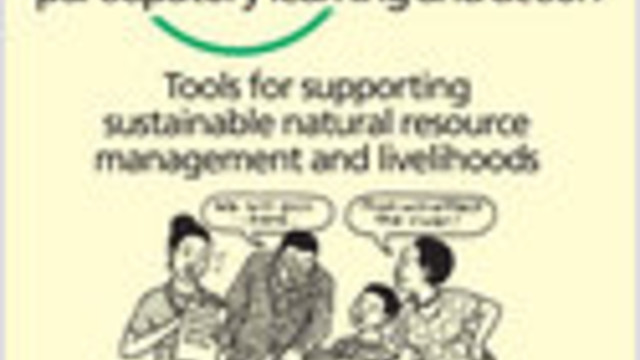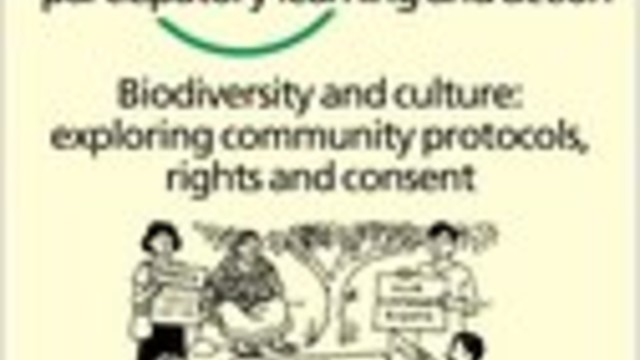PLA 61: Tales of shit: Community-Led Total Sanitation in Africa
This edition of Participatory Learning and Actio focuses on a radical new participatory approach called Community-Led Total Sanitation.
- Participatory Learning and Action: a journal for newcomers and experienced practitioners alike
- About PLA: Background, aims and history of the journal
- Explore the archive: browse and download issues or individual articles
November 2010
Guest editors: Petra Bongartz, Samuel Musembi Musyoki, Angela Milligan and Holly Ashley
Where do you shit? In developing countries, the answer to this question may determine whether you live or die. Around 2.6 billion people do not have access to a toilet – about four in ten of the world’s population. Instead, they defecate in the open – in the bush, the forest, by riverbanks and lakes, near train tracks and by the side of the road. The consequences are dire. Shit carries disease and is a major killer. Lack of sanitation also impacts on general well-being, human dignity and personal freedom. Despite this, many sanitation programmes have failed to convince rural communities of the benefits of good hygiene.
This has begun to change in recent years with the development of a radical new participatory approach called Community-Led Total Sanitation (CLTS).
CLTS has encouraged millions of people around the world to look at, talk about and tackle the problems caused by open defecation. This has not happened through education, force or monetary incentives, but through the facilitation of a participatory process called ‘triggering’. Using Participatory Rural Appraisal (PRA) tools, communities analyse their hygiene habits and practices and mobilise to take collective action to totally sanitise their environments.
Following its development and spread in Asia, CLTS is now being piloted in Africa. This special issue of Participatory Learning and Action draws on a growing body of experience, and includes case studies from East, Southern and West Africa.
The overview article provides an introduction to CLTS, and discusses key elements for successful CLTS and issues around scaling up CLTS in Africa.
The resources section highlights key publications, websites and online communities for CLTS practitioners.
This issue will be of interest to the many organisations and individuals involved in implementing and taking CLTS to scale in Africa and elsewhere, as well as to other participatory practitioners.
About the editors: Petra Bongartz is coordination, communication and networking officer for CLTS at the Institute of Development Studies (IDS), University of Sussex, UK. Samuel Musembi Musyoki is director of programmes for Plan International Kenya. Angela Milligan and Holly Ashley are co-editors of Participatory Learning and Action.
This work is licensed under the Creative Commons Attribution-Non-Commercial-Share Alike 3.0 Unported License. Content can be freely reproduced for non-commercial purposes, provided the source is fully acknowledged.
Follow the links below to download the whole issue or individual articles in pdf format:
Also available in French (en Français)
Contents
Theme section: Tales of Shit, Community-Led Total Sanitation in Africa
Overview
Petra Bongartz, Samuel Musembi Musyoki, Angela Milligan and Holly Ashley
Scaling up CLTS in sub-Saharan Africa
Sophie Hickling and Jane Bevan
Part 1: Community-level processes
Freeing the imagination: innovations in CLTS facilitation in Zimbabwe
Herbert Kudzanai Chimhowa
Walking down the forbidden lane: 'shit talk' promotes sanitation
Mariama Munia Zombo
From amazzi to amazi: it’s not a water problem
Terry A. Wolfer and Robin W. Kloot
Breaking shit taboos: CLTS in Kenya
Buluma Bwire
CLTS in East Africa: a path to child and youth empowerment?
Cathy Shutt
Part II: Management/organisational changes
Participatory development approaches need participatory management!
Ashley Raeside
Adopting CLTS: is your organisation ready? Analysing organisational requirements
Jean-François Soublière
Part III: Going to scale
Revolutionising sanitation in Zambia: scaling up CLTS
Giveson Zulu, Peter Harvey and Leonard Mukosha
Challenging mindsets: CLTS and government policy in Zimbabwe
Samuel Rukuni
Scaling up CLTS in Kenya: opportunities, challenges and lessons
Samuel Musembi Musyoki
Shit travels fast: towards a global CLTS network
Petra Bongartz
Part IV: Tips for trainers
A note for trainers, facilitators and those commissioning CLTS training
Samuel Musembi Musyoki
Triggering: an extract from the Handbook on Community-Led Total Sanitation
Kamal Kar with Robert Chambers
Let's write! Running a participatory writeshop
Angela Milligan and Petra Bongartz
Regular Features
Related links
Community-Led Total Sanitation (CLTS)
The CLTS website aims to be a global hub for CLTS, connecting the network of practitioners, communities, NGOs, agencies, researchers, governments, donors and others involved or interested in CLTS. The site contains practical information about the approach, information on CLTS in different countries, research papers, relevant news and events and many other useful materials. It aims to be an up-to-date virtual resource centre and is a space for sharing and learning on CLTS across organisations, countries and sectors. The site reflects the rich, varied and dynamic nature of the approach and hopes to encourage debate around key aspects of CLTS in order to improve policy and practice.
This issue looks at sanitation more widely, but there are references to CLTS. It includes:
- Addressing sanitation through behaviour change communication.
- Interact within our new social networking platform
- Engaging children and communities in sanitation action.
- Social marketing approaches to sanitation.
- Snapshot: how partnerships have supported sanitation communication.
The EcoSanRes (Ecological Sanitation Research) Programme aims to develop and promote sustainable sanitation in the developing world through capacity development and knowledge management as a contribution to equity, health, poverty alleviation, and improved environmental quality.
International Water and Sanitation Centre (IRC)
Aims to bridge the knowledge gap and promote joint learning with partners for improved, low-cost water supply, sanitation and hygiene. Information-packed website, including a digital library of grey literature.
Plan, an international NGO focused on children, has taken a leading role in introducing CLTS in East and Southern Africa. Their website includes useful case studies, videos and publications about their CLTS work.
STEPS Centre Water and Sanitation
STEPS is a global research and policy engagement centre, bringing together development studies and science and technology studies. There is a water and sanitation section on the website, with extensive resources.
The Sustainable Sanitation Alliance (SuSanA) is an informal network of organisations (currently 125 from 45 countries) who share a common vision on sustainable sanitation. Has a documents database, mostly downloadable.
UNICEF aims to help build a world where the rights of every child are realised, working to influence decision-makers, and with a variety of partners at grassroots level. It is active in 190 countries through country programmes and National Committees. Community led approaches to total sanitation are a key element of UNICEF’s global WASH strategy. Its website contains a number of case studies of CLTS in East, West and Southern Africa.
Water, Engineering and Development Centre (WEDC) Loughbourough
WEDC is one of the world's leading education and research institutes for developing knowledge and capacity in water and sanitation for low- and middle-income countries. Has many publications to download free of charge.
WaterAid is an international NGO working to improve access to safe water, hygiene and sanitation in 26 countries in Africa, Asia and the Pacific region. The website has a library of downloadable policy, advocacy and research publications
The Water Supply and Sanitation Collaborative Council (WSSCC)
A partnership organisation mandated by the UN, the WSSCC focuses on networking and knowledge management, advocacy and communications and administering a Global Sanitation Fund, The latter provides funding for sanitation initiatives, recognising that sanitation is both vitally important and often neglected.
Website containing technical resources and providing a forum for people working in the areas of water, sanitation and hygiene.
The Water and Sanitation Program (WSP) is a multi-donor partnership administered by the World Bank to support poor people in obtaining affordable, safe and sustainable access to water and sanitation services. It works directly with client governments at the local and national level in 25 countries through regional offices in Africa, East and South Asia, Latin America and the Caribbean, and in, Washington D.C. Its aim is to share best practice across regions, and it includes various publications on CLTS.
World Toilet Organisation (WTO) is a global non- profit organisation committed to improving toilet and sanitation conditions worldwide. Useful resources section on the website.



